Business over the past two decades has undergone a transformational change. This transformation was initiated by the technology industry for B2B oriented businesses in order to deliver efficiency and productivity. Soon, this wave of transformation was applied to consumer-oriented businesses as well and speed became the subtext of every business transaction.
So, what does this transformation mean for your business?
This clearly means that sooner, rather than later, your business will have to evaluate itself on many fronts of speed, efficiency, and communication. Today’s consumer has graduated from just buying a product to fulfilling a need by buying the product’s identity.
Thus, the consumer has identified 3 Golden Factors of making a purchase:
- Speed
- Ease of Transaction
- Identity
As we understand these factors, let us ask ourselves as business owners as to how do we act as consumers when we like to source or make a purchase? We like to make an informed decision by asking around about the product and once having made that decision, we would like to quickly complete the transaction with the least possible effort to obtain the product as well. Simply put, I would like to go to the moon, but don’t ask me to assemble the rocket first. Sell me the tickets, pick me up and off I go!
Related Articles:
- The Ultimate Guide to Marketing Your Brick and Mortar Business Online
- 21 Marketing Tactics That Will Rule in 2017
- 10 Game-Changing Internet Marketing Tips for Business Success
However, these 3 factors cannot be executed in the real world by business owners becoming the immortal Marvel Superhero “Spiderman” who can deliver that pizza by speed, has a superhero identity and delivers it with ease to the top floor of the building. The business owner can still execute all these 3 factors in their transactions albeit without being Spiderman.
Once we have identified that our consumer’s behavior has also changed, we need to find out which channel of marketing will fit the bill in order to best serve our consumer base, keeping these 3 factors in mind.
Here’s what comes into play – Digital Marketing!
What is Digital Marketing?
Wikipedia provides the definition of Digital Marketing as:
“Digital marketing (also known as data-driven marketing) is an umbrella term for the marketing of products or services using digital technologies, mainly on the Internet, but also including mobile phones, display advertising, and any other digital medium.”
So, we see that the medium of the internet has become the connector for good and services to reach consumers in markets as well as outside your traditional markets. This is executed by reaching consumers on different platforms of mobile, desktop and other geo-mobile device advertising.
According to research by PricewaterhouseCoopers (PwC), the global digital marketing industry is expected to reach a value of USD 185.4 billion by the end of 2017.
Some key takeaways from PwC’s research are as follows:
- This is nearly a 30% share of the entire advertising industry worldwide.
- The market has grown at a rate of almost 13% in the last five years
- It has already become the second biggest spend after television.
- The segment accounting for the largest share of the digital advertising growth is ‘search’, having a 41% of market share so far into 2017.
- The display market is also growing steadily at a rate of 10%
- Display market is expected to reach a value of nearly USD 50 billion by the end of this year.
- Mobile advertising is also skyrocketing with growth expected to increase by a staggering 27% over the next five years, crossing a value of USD 27 billion by the end of 2017.
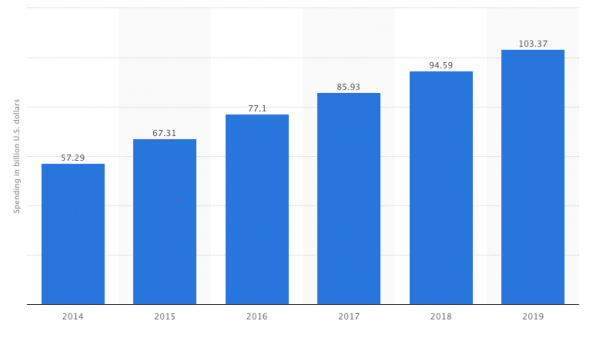
Figure 1: Growth in Digital Marketing Spending in the US (in USD Billion), 2014-2019 (Source: Forrester Research)
According to another research firm, Forrester Research, digital marketing spending is going to continue to increase exponentially till the year 2019. The company expects the US digital marketing industry to reach a value of USD 103.37 billion by the end of 2019, a jump from just USD 57 billion in 2014. The firm attributes this growth to primarily these three factors:
- A recovery in the US economy that has boosted tech confidence
- Media expansion has provided advertisers with much more options
- On-ground performance has given marketers more reasons to trust digital
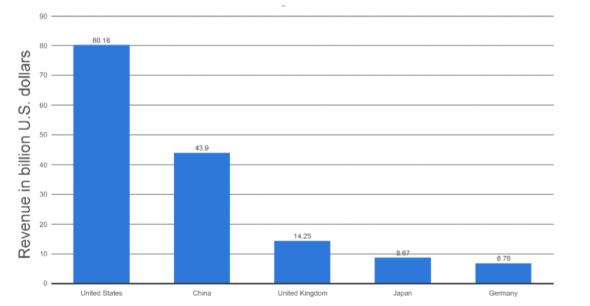
Figure 2: Digital Marketing Revenues by Countries (in USD Billion), 2016 (Source: Forrester Research)
How Does Digital Marketing Impact Consumers of a Business?
As a local business owner, you might ask my consumers know me for the past 40 years. They have not gone anywhere nor have I. They know me enough to come when they need something.
Sure, they know you – but for now. Thanks to technology, now, other marketers know them too! They are not going to leave any stone unturned to reach YOUR consumers and let them know that we can match as well as do better on the above 3 Golden Factors!
Now, as a business owner, while you keep on thinking that your consumers will beat the path to your door, a crucial factor that YOU overlooked in this entire panorama is:
They will beat a path to YOUR DOOR when they WILL get out their door FIRST!
What’s that you mean to ask? Well, that is the 21st-century consumer for your business! This consumer is being constantly bombarded by product communications at their homes, as they travel and even when they are using the restrooms! A business owner will always want that their consumers first and foremost choose them over others.
Would you not want to be in that sweet spot too?
Today, digital marketing reaches consumers with product communication often even before they are able to articulate their needs into an actual product – and that product is presented to them.
So, we understand that Digital Marketing has a clear and measurable effect on the consumers of any business, but does it also affect the business itself as well?
How does Digital Marketing Impact Business?
Think of this in one simple way: Cost per Unit Sold
What is Cost per Unit Sold? This is the net cost that it takes you to sell any 1 unit of product or service to your customer when they hand over the money to YOU. The customer’s money has already undergone deductions by the time it reaches you. Never Forget: Taxes, Lease, Suppliers, and Advertising come before your share in any product sale.
While you cannot do anything about the former two, you can surely look at ways to tweak the latter two and build in margins which will show you profits.
How?
- Sourcing: Just the way you are now looking out for ways to source your product inputs cheaper, so are the suppliers who are looking for ways to reach you! This meeting of ends happens via Digital Marketing, wherein they sell their product to you by advertising it online and save costs of physical advertising which they pass on to YOU as benefits in Cost Reduction. The best part – usually they will deliver it just the same as your regular vendors but now YOU have put a new nickel in your pocket!
- Advertising: The old days of advertising demanded that a business owner only consider advertising when they can afford a predetermined investment package which was usually quite hefty! Digital Marketing has revolutionized advertising because the medium of Internet is the greatest equalizer of all. Today, no matter what your business turnover, you can now walk into a digital marketing agency and tell them you will like to spend X$ only and this is what you will like to advertise about! Your business can now have a voice against the biggest and the bluest in the world and stand out with its own identity. This is possible because you made the smart decision to deploy ‘go digital’ when the rest still keep on spending big bucks on traditional advertising packages!
How do I Use Digital Marketing as my Business Strategy?
Now that we have established that Digital Marketing has a clear impact on the consumers of a business as well as the business itself, we now need to evaluate how our business strategy needs to leverage it and meet the 3 Golden Factors of Purchase mentioned above.
Firstly, approach this medium of advertising with a very open mind as the medium itself is new and always evolving. This medium is trying to get better every day and reaching consumers in new, delightful ways which build the consumers’ love for a business.
The basic strategic premise of Digital Marketing is to not look at these 3 Factors in a vacuum, but as a single interdependent organism of service.
The speed of finding your products, ease of buying and paying for them, builds the identity of amazing in the minds of the consumers which has a ripple effect when they go and tell others about your “amazing” business.
Obtaining Customers through Digital Marketing
This is the zone of recommended and repeat sales which every business owner will now strive to be a part of and sustain their business into a new era. An existing business owner who is wondering where to get new customers can leverage Digital Marketing to first get his present and old customers to start talking about his business. Then they can run a campaign via any of the digital channels to influence new consumers to try out their product or services.
A new business owner can leverage digital channels to showcase their product or service via video or social media and send out samples to consumers who would like to try out their product. This starts the conversation about the brand and builds a consumer base out of which a certain fraction will come back and the business then asks them to recommend it to others.
Digital First, Traditional Later
A very important decision to be made by any business owner is also whether to use Digital Marketing first or to use traditional avenues of marketing in the initial stages of their business. This will depend on the kind of budgets the business enjoys and also its target consumers.
If your business has a very large generic market and also has the budgets to go all in, then also you roll out digital channel campaigns first, with the traditional channels following closely or even concurrently. This creates a splash all around the consumers in the digital space as well as traditional media space and gets the product immediate attention.
However, if your product has a measured budget and appeals to a niche market or needs to build its market, then digital channels are the way to kick off. This ensures that the product receives more conversation under the radar and starts to build a loyal base of customers. Thereafter, the traditional channels can kick in a horizon of some years.
This establishes that any business, whether existing or new, can immediately deploy Digital Marketing as its first and stable business strategy. And then, add on as many traditional advertising channels to further tie in its digital audience and boost their voice about the business further.
*This guest post was written by Lena Hemsworth.
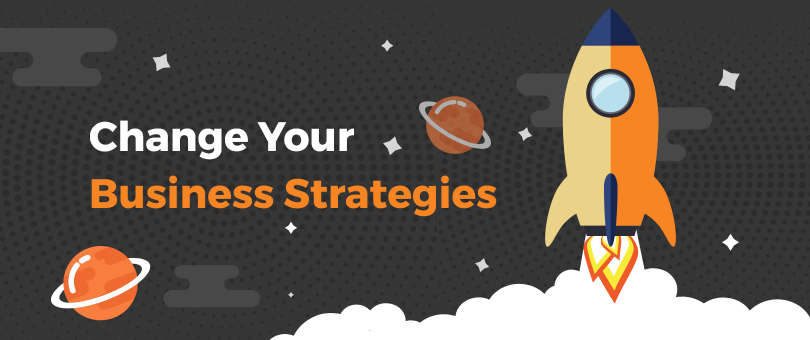



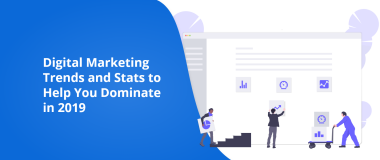
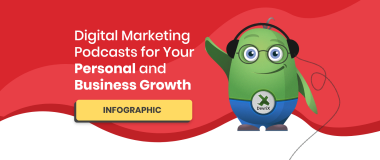
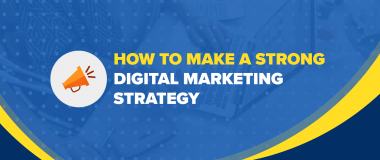
![Influencer Marketing Statistics Every Business Should Know [Infographic]](https://devrix.com/wp-content/uploads/2019/10/Influencer-Marketing-Statistics-Every-Business-Should-Know-Infographic@2x-380x160.png)